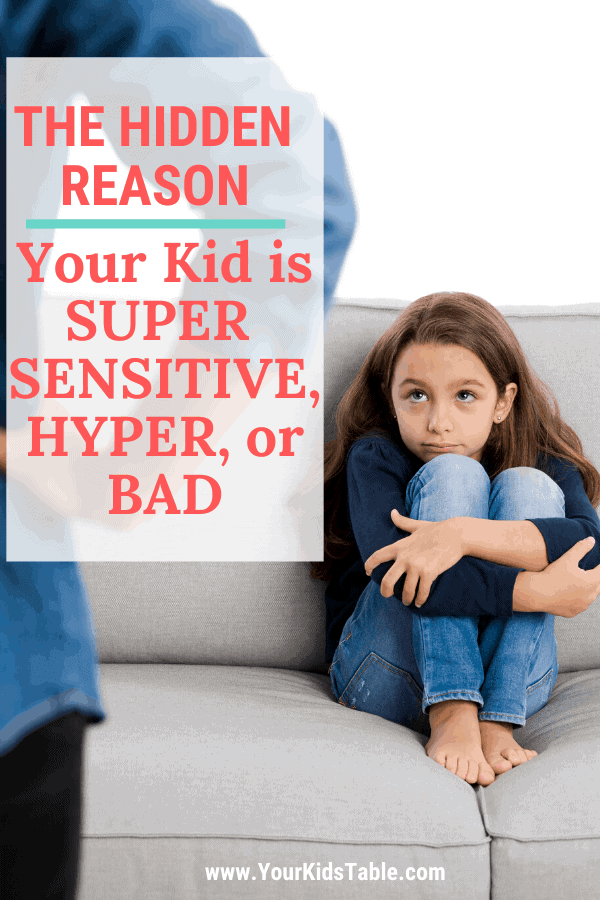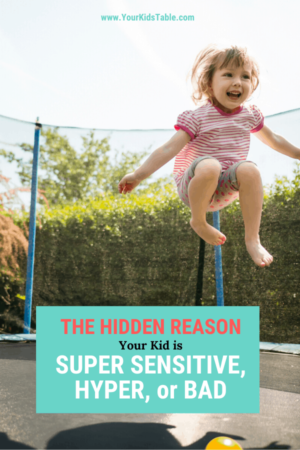So many kids are commonly labeled as super sensitive, hyperactive, or just plain bad. But, there’s often a reason for these behaviors and challenges that most parents aren’t taught about. Find out what it is…
We like to put labels on things. Everything from our food to our clothing style (got a boho, athletic, or classic style?)
There’s nothing wrong with that, it helps us categorize and understand the world around us. Part of that world is the people around us. You might say your sister is relentless or your best friend is the most generous person in the world.
And, it continues with our kids, particularly when they consistently do something that is annoying, challenging, or super frustrating.
They’re your kid, and they aren’t going anywhere, so your mind will look for a way to cope with the constant bouncing off the walls and climbing the furniture, or freaking out when it’s time to get a haircut or go to a party with lots of people, or, when they NEVER seem to listen to a word you say.
To understand and cope, you might say, “They’re hyper, sensitive, or just plain bad.”
That statement may very well be true, but as an occupational therapist, there’s often so much more going on beneath the surface. As an OT, it’s my job to look beyond the surface and ask – Why?.
- Why are they scared to go to parties with lots of people?
- Why do they startle and seem to scare very easily?
- Why are they so wild, constantly running and roughhousing?
While there’s certainly a lot of different factors that can play a role in a child’s behaviors, personality, and actions, there’s one massive thing that hyper, sensitive, and “bad” kids often have in common…
The Hidden Reason Not Enough People Are Talking About…
That thing that’s often hidden underneath all the hyperactivity, sensitivity, and poor listening is sensory processing!
It’s easy to understand why the vast majority of parents have never even heard of sensory. Even though it’s a part of our daily life, we never give much thought to why you love spicy food and your husband hates it. Or, why you love the feel of sand in your toes and even find yourself touching that sequin pillow as you walk by it in Target.
Sensory processing is constantly happening in our brain. Our brain has to sort through all the sensations we experience from our vision, hearing, smell, taste, touch, movement (vestibular), and understand where our body is in space (proprioception) so that we can walk around without falling or bumping into everything.
Then our brain has to decide if it’s going to pay attention to any one of those sensations or ignore it. Imagine what it would be like if you were constantly aware of how your jeans felt on your legs or the slight steady noise of the lights above your head.
It would be distracting right? Even irritating. It might make it hard to concentrate on anything else.
This is what happens to a lot of our misunderstood kids. Their brain, their sensory processing, is paying attention to sensations that most of our brains choose to ignore.
And, the list of examples goes on and on:
- Lights are too bright
- Tag in the shirt won’t stop itching
- Smell from the other room stinks
- Hands feel sticky from lunch
- Shoes are too tight
- The playground swing feels too high off the ground to even sit on
- The slight bump on their arm from accidentally running into another child won’t stop hurting
- The bath water is too hot
- The bath water is too cold
- Getting hair washed is painful
- Finger nails being cut feels so weird they can’t stand it
- Having some slight hairs on their neck during a haircut feels like fiberglass being rubbed on their skin
- The grass hurts on their bare feet
- The sand hurts when they touch it in their sandbox
How They Feel is Probably Not How You Feel
As a parent, you may not know that any one of these things, and more not listed above, are affecting your child. So often, even with kids that are verbal, they don’t tell us what is making them mad, irritated, not listen, or be super sensitive.
Instead we just see crying and acting out.
And sometimes they do tell us, but it’s hard to relate to. Sure, you’ve noticed a tag on the back of your shirt and it itches a little, but it’s not enough to have a meltdown over. It’s easy to think that they need to toughen up and get over it.
The key distinction here though is that how they feel that tag in their clothes is not how you feel about an itchy tag in your clothes.
Remember their sensory processing is unique. And, for kids that have a lot of these sensitivities, their sensory processing may not be working very efficiently. Just like some kids that need help learning to talk or walk, they also may need help improving their sensory processing.
That’s just one scenario… (Other ways sensory processing can affect kids)
While some kids have brains that are paying way too much attention to sensations, aka sensory input, other kids sensory processing isn’t paying enough attention to sensory input.
It’s like their brain is ignoring a lot of sensations.
And, our brains wants sensations, it’s how we were designed. In order for our kids to reach developmental milestones and learn, they need movement, touch, smells, and other sensations. The brain will crave it, and won’t allow your child to focus on anything else until it gets the sensations it needs.
Even if your child is technically getting all of the sensory input they need, if their sensory processing isn’t registering it, it doesn’t count.
What you’ll see in this scenario is a wild, active child. They don’t seem to stop. They run, climb, jump, and spin. You joke about where their off switch is. You may even worry they have ADHD (more in a minute on this diagnosis and others). But, at the root of it all is their sensory processing.
Kids that are seeking out lots of sensations also may:
- Lick things in their environment, like the wall, TV, pillow, and other items (often to a parent’s embarrassment and confusion)
- Touch everything with their hands
- Jump off of furniture or other high places
- Spin around constantly, never getting dizzy
- Climb the furniture
- Rough house and wrestle frequently
- Hang upside down all the time
- Crash or bump into lots of things and other people in their environment
- Want big bear hugs or snuggle time often
- Squeeze into tight spots like behind the couch
- Run across a parking lot without looking
- Seem to never get hurt, very high pain tolerance
- Difficulty calming down to go to sleep
- Loves crunchy, sour, or spicy foods
- Bite or chew on their shirt, tops of pencils, or anything else they can find
- Smell all sorts of things in their environment
- Stare at ceiling fans or other spinning objects
- Love bright, flashing lights
- Wants to listen to loud music
The tricky part is…
Although I’ve just given you two more labels:
- Kids that pay too much attention to sensations because of their sensory processing (meaning they can’t help it)
- Kids that don’t pay enough attention to sensations because of their sensory processing (again, they can’t help it)
Understanding your child’s sensory processing issues, or as I’d rather call them “sensory differences”, usually isn’t so cut and dry. Many kids may over-notice visual sensations, but under-notice movement sensations. It can be a mash up across the 7 different senses.
When a child over-notices sensations, it’s called avoiding and means they are over-processing, meaning too much paying attention!
And, when a child under-notices sensations, it’s called seeking and means they’re under-processing sensory input. I’ll be teaching your more about that distinction between under- and over-processing in a new post in just a couple of weeks, but for now, it’s important to know that many kids are misunderstood when their hyperactive, sensitive, or bad.
When a child is focused on avoiding or getting sensations, because that’s all their brain will allow them to do, then they aren’t able to listen, follow directions, play with peers well, or even learn, especially in a traditional school environment.
Try to Imagine What it Would Be Like
If you’re processing sensory input well, this can be hard to relate to. So we’ll have to use some more extreme examples.
Imagine trying to sit in an advanced calculus class (assuming you aren’t a math genius), it’s new information for you and you have to pay attention closely to get it, but your pants are sopping wet.
Or, there’s a fly that won’t leave you alone, it’s buzzing in your ear, landing on your arm, then your nose.
Or, maybe somebody just ran their nails down the chalkboard.
Are you able to pay attention well? Follow directions? Communicate with the other students and teachers?
No, of course not.
But, you’d have the skills to at least communicate why, and some basic coping mechanisms. Kids don’t. Because they can’t communicate, others think it’s not that big of a deal, and the subtleties to sensory processing aren’t well known, some kids with sensory processing difficulties slip through the cracks.
My deepest hope in writing this post is that you look for any possible sensory differences in your child so that doesn’t happen to your child. And, if you know someone else that needs this info, use the share buttons below to send it there way.
Sensory Red Flags You Might Be Missing Free Printable.
Finding a link between these confusing and frustrating behaviors to sensory can change everything. Because once you understand that your child has sensory needs, you can actually improve them. Get 21 different red flags that your child might be waving about their sensory processing! Knowing why your child does the things they do will allow you to help them work through the challenges they face.
Click here to get the printable
What If Your Child Has ADHD, Autism, or Another Diagnosis
While some kids with sensory processing difficulties, or even Sensory Processing Disorder, seem to get mis-diagnosed, most are not. It’s extremely common for kids with ADHD, Autism, and many other diagnoses to have sensory differences.
However, in these communities, I’ve been shocked to find that isn’t always communicated well.
If your child has one of these diagnoses, it’s far more likely that sensory processing is a component of some of the behaviors they exhibit than not. Addressing sensory needs through a sensory diet or sensory integration therapy can have a dramatic effect on their learning, socialization, and more.
That’s really good news!
More on Sensory Processing for Kids
37 Sensory Toys to Help Kids Learn, Communicate, and Calm Down
100+ Awesome and Easy Sensory Diet Activities
60 Printable Sensory Diet Cards for Kids to Thrive
Want to find this again? Pin it to your Parenting Board
Alisha Grogan is a licensed occupational therapist and founder of Your Kid’s Table. She has over 15 years experience with expertise in sensory processing and feeding development in babies, toddlers, and children. Alisha also has 3 boys of her own at home. Learn more about her here.





My (almost) 3 year old is definitely sensory seeking! How can I help him with this??
Nikki, glad you’re here! Start with this post on activities for sensory seeking kids! It’ll get you on the right track 🙂
Best,
Laura
Your Kid’s Table team member
Hi I’m a Grandmother of fraternal twin two year old boy and girl reaching out for my granddaughters sake . I guess the main reason I’m reaching out is because I’m so sick of hearing mom say the girl twin is having a day in other words being bad. Her mommy my daughter is a nurse and doesn’t want unsolicited advice mostly because she’s knows everything and has since she was a teenager lol ,but also doesn’t want labels attached to her children which I totally understand. That being said I have myself so many of these let’s call them symptoms and so does my youngest daughter who is also grown and now that I know this is what’s going on with my little granddaughter . How can I bring up this topic without causing my daughter to get upset?
Hi Teresa,
That can be a tricky situation! If your daughter is discussing a particular challenge with you, that might be an opportunity to have a conversation. We have a free sensory workshop with specific ideas that might be helpful for you to check out. You can save your seat HERE.
Best,
Andrea
I have an Autistic Son…….. Look in your area to find a chiropractor who works with children….. out chiropractor is AMAZING with my lids and she works on the vegas nerve with also helps with some of the behaviors
Hi Dina, I have a sensory child that’s all grown up now (almost 21) and now that he is no longer doing sports (since he left for college) he is struggling. Can you recommend someone he can talk to about this? I’m in the field (EI/CPSE) but he takes advice better from other people.
Hi I’m a Grandmother of fraternal twin two year old boy and girl reaching out for my granddaughters sake . I guess the main reason I’m reaching out is because I’m so sick of hearing mom say the girl twin is having a day in other words being bad. Her mommy my daughter is a nurse and doesn’t want unsolicited advice mostly because she’s knows everything and has since she was a teenager lol ,but also doesn’t want labels attached to her children which I totally understand. That being said I have myself so many of these let’s call them symptoms and so does my youngest daughter who is also grown and now that I know this is what’s going on with my little granddaughter . How can I bring up this topic without causing my daughter to get upset?
I work as and Educational Assistant in an elementary school and trying to convince a teacher that this is actually a thing that the child can not help is like banging your head on the wall which incidentally is exactly what some of the students do with this difficulty. I will continue to advocate for the children with whom I work and I believe the online video may help if I can convince them to watch it.
Hey Susan,
Thanks so much for sharing your story. We understand how hard this can be for some and hope that this is helpful! Please let us know if there is anything you need from us and thank-you so much for trying to spread awareness!
Best,
Desiree
Hi Alisha
My little girl just turned 1 but I’ve been noticing things are a little different with her and I’m not sure how to help or if I have to do anything different at all. She seems to get overwhelmed easy, will start crying if something is too noisy, or if a book makes sounds when other books don’t. Will get this look of open mouth with what looks like a small seizure, shaking of arms and legs and funny blinking but not real noticeable to outsiders, its quite subtle, it happens when she is trying to process many senses at the same time. Other things you’ve mentioned as well, cry’s when I wash her hair, has a high pain tolerance, right from birth she has never cried for a needle, barely cries when she does hurt herself. Although when she fell off the couch the first time we couldn’t stop the screaming and within seconds she was projectile vomiting from the stress, hospital visit showed she was fine. She pulls her hair when she is stressed, bites her hands/arms and bites her shirt at times she is not teething. Should I see someone about these little things or just let her adapt to things herself? Not sure whether they are even issues. She is really good otherwise, chill and happy. Any advice would be greatly appreciated.
Hey Paula,
Thanks for reaching out to us! You can always definitely reach out for an evaluation to see if any therapists can provide you some input. Sounds like she may just need some sensory guidance and activities that may help her process and adapt as well. We do have some other articles that could be of help to you as well, you can check them out HERE
Best,
Desiree
I read your article, I have a child in my care that has problems as you describe, I have been trying to find help for him, unfortunately all I have found is roadblocks, I don’t have Facebook so watching the live sessions is out of the question, is there any other way to get the sessions, books? Videos? I really would love to help this child. Thank you.
Hey Dina,
Thanks for reaching out! We do have a free sensory workshop that may help in providing some information for you! It is all online and you can choose a time that is right for you, if you do not see a time that works, check back as we are always adding times! Save your seat HERE
Best,
Desiree